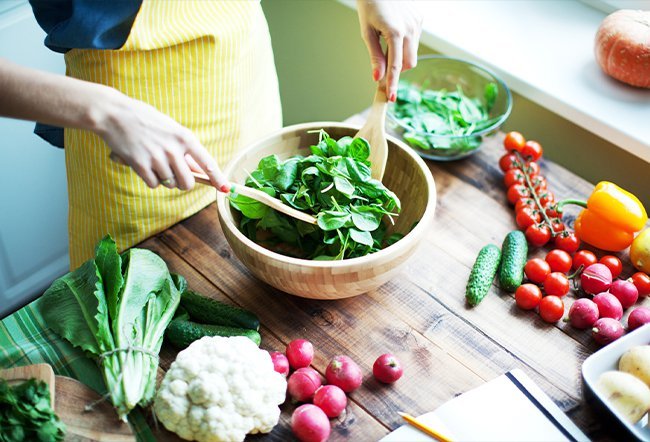What Foods Do Vegetarians Eat?

We often think that a typical vegetarian diet consists of eating plant-based foods. There are, however, different vegetarian diets that include or exclude different types of foods.
| Types of vegetarian diet | Foods that can be eaten |
|---|---|
| Lacto-vegetarian diet: Allow all foods except meat, seafood, poultry, and eggs |
|
| Ovo-vegetarian diet: Allow all foods except meat, seafood, poultry, and dairy |
|
| Lacto-ovo-vegetarian diet: Allow all foods except meat, seafood, and poultry |
|
| Pescatarian (or pesco-vegetarian) diet: Allow all foods except meat and poultry |
|
| Vegan: Allow all foods except those of animal origin including meat, seafood, poultry, and dairy |
|
How to meet your protein requirements while on a vegetarian diet
Meeting certain nutritional requirements, particularly protein requirements, is often considered a challenge for vegetarians. Vegans may also have increased susceptibility to vitamin D and vitamin B12 deficiency.
By choosing protein-rich vegetarian foods, however, you can meet your protein and nutritional needs within your calorie requirements.
| Food items | Quantity (edible portion) | Protein content (in grams) | Calories (in kilocalories) |
|---|---|---|---|
| Soy (defatted) flour | 100 grams | 51.1 | 366 |
| Soy milk | 1 cup (245 grams) | 7 | 81 |
| Tofu (firm) | 1/2 block (84 grams) | 7 | 62 |
| Blue cheese | 1 ounce | 6 | 100 |
| Cheddar | 1 ounce | 7 | 114 |
| Feta cheese | 1 ounce | 4 | 75 |
| Mozzarella (made with whole milk) | 1 ounce | 6 | 80 |
| Ricotta (made with whole milk) | 1 cup (246 grams) | 28 | 428 |
| Cottage cheese | 100 grams | 11 | 300 |
| Greek yogurt (nonfat) | 100 grams | 10 | 59 |
| Milk (whole, 3.3% fat) | 1 cup (244 grams) | 8 | 150 |
| Egg (whole)* | 1 large (50 grams) | 6 | 75 |
| Pinto beans (raw) | 100 grams | 21 | 347 |
| Kidney beans (raw) | 100 grams | 24 | 333 |
| Chickpeas (raw) | 100 grams | 19 | 364 |
| Cashew (oil roasted and salted) | 1 cup (130 grams) | 21 | 749 |
| Mixed nuts (salted and dry roasted) | 1 ounce | 5 | 168 |
| Sunflower seed kernels, dry roasted, with salt | 1/4 cup (32 grams) | 6 | 168 |
| Walnuts (chopped) | 1 cup (120 grams) | 18 | 785 |
*For ovo-vegetarians and lacto-ovo-vegetarians
Other vegetarian sources of protein include edamame, mushroom, broccoli, green peas, sweet potato, pulses, asparagus, tempeh, quinoa, brussels sprouts, and corn.
If you think you are not able to meet your protein requirements through a vegetarian diet, consult a qualified nutritionist or your doctor, who may prescribe protein supplements if needed.
What are the health benefits of following a vegetarian diet?
A vegetarian diet consisting of whole foods including fruits, vegetables, whole grains, nuts, and seeds can have various health benefits such as
- Improved heart health
- Regulated blood sugar levels
- Reduced risk of certain types of cancer
- Better weight management
- Regulated blood cholesterol levels
- Management of blood pressure
An entirely plant-based diet, however, may put you at risk of certain nutritional deficiencies, including vitamin D, vitamin B12, omega-3 fatty acids, zinc, and iron deficiencies, which can be avoided by including a variety of foods in your diet.
Consulting a nutritionist may help you tailor your diet to your needs. They may also prescribe supplements if needed.
Due to uncertainty in getting all nutrient demands met through a plant-based diet, some people become flexitarian or semi-vegetarian. They reap the benefits of a vegetarian diet by making plant-based foods a major portion of their diet while eating meat, poultry, dairy products, eggs, and seafood occasionally or in small proportions.
